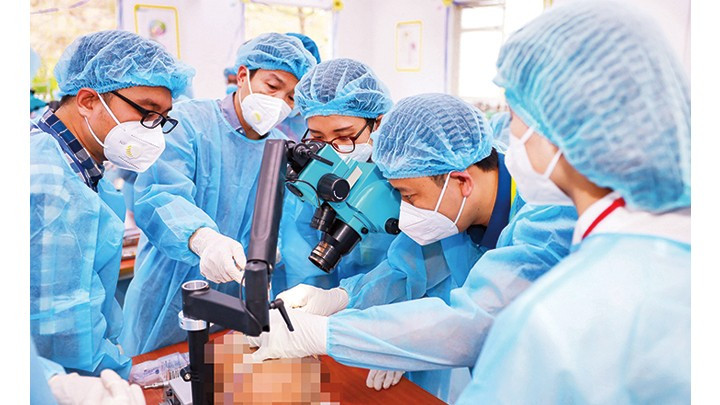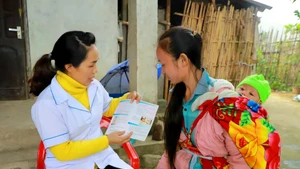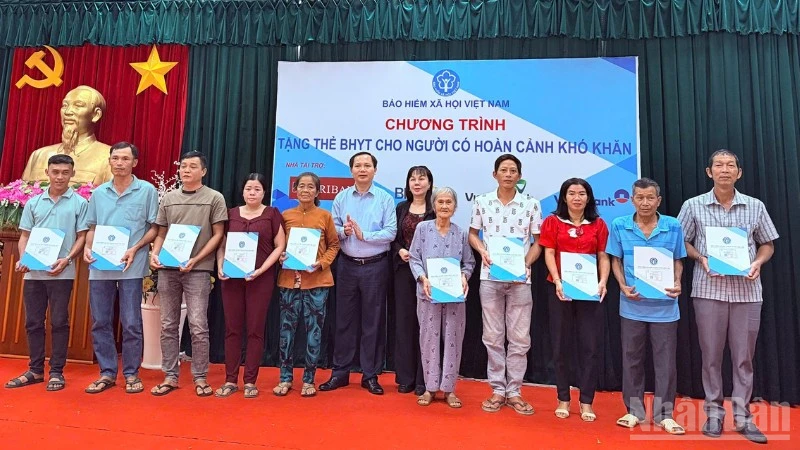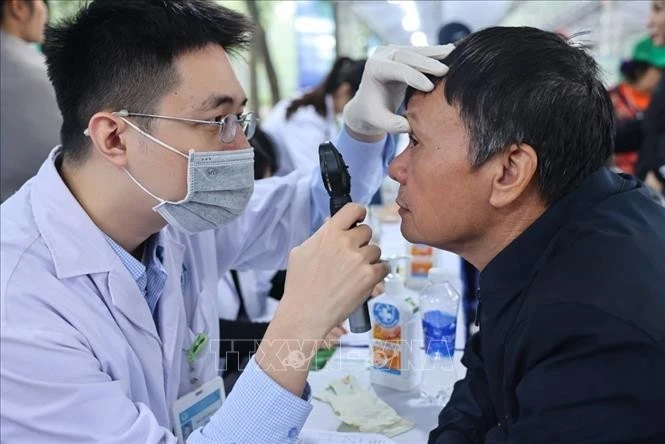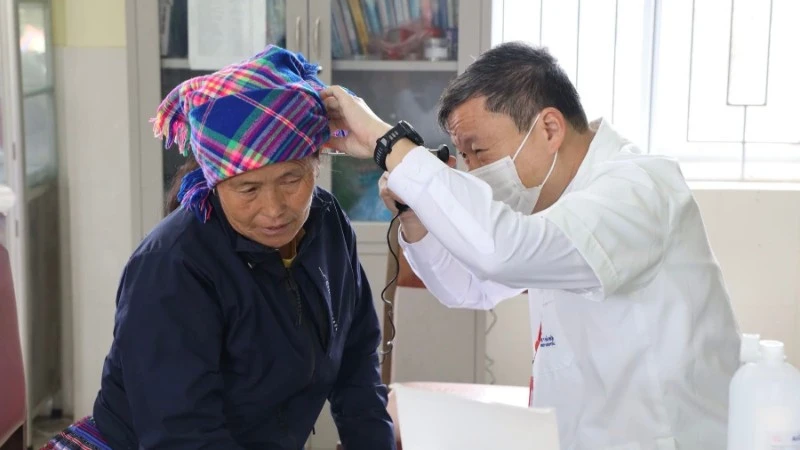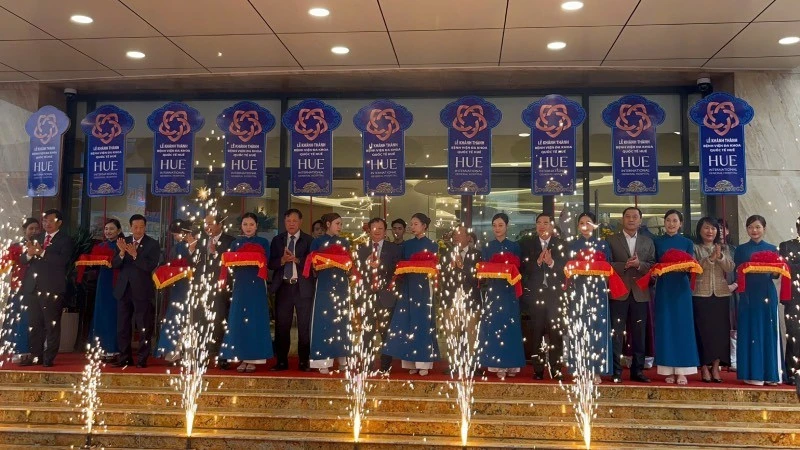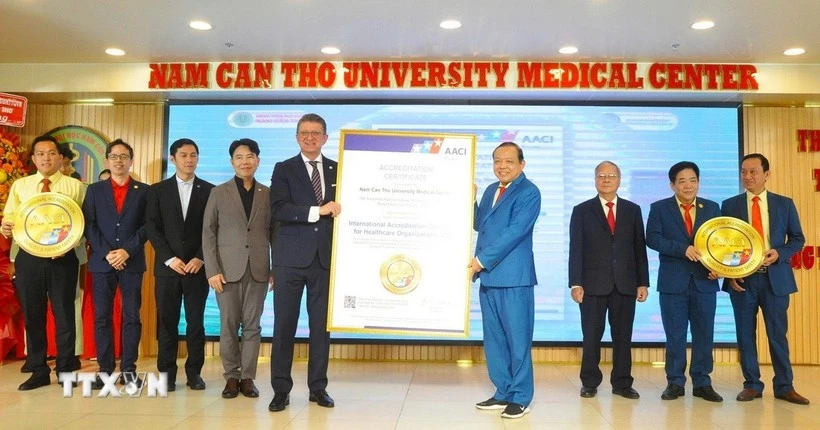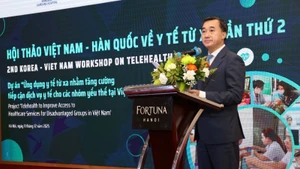Alongside the initiative of tuition waiver policy for public school students, this policy lays a fundamental foundation to ensure equal access to essential public services for every citizen—paving the way for a just, inclusive, and sustainable society where no one is left behind.
New guidelines and policies
In recent times, Vietnam’s social welfare policies have increasingly taken root in daily life. Notably, the 2024 Law on Social Insurance has expanded coverage, while enhancing rights and benefits for participants. The standard allowance for people with meritorious service to the revolution has seen its highest-ever increase of by 35.7%. Alongside this, allowances for other social protection beneficiaries have also been raised. Under the revised 2024 Law on Health Insurance, effective from January 1, 2025, participants with rare and serious illnesses, or those requiring surgery and high-tech procedures can receive full insurance coverage even at hospitals not originally registered, without needing referral documents as previously required. Efforts are underway across the country to eliminate substandard housing for poor and near-poverty households. The revised Law on Employment, which is expected to be passed during the 9th session of the National Assembly in May 2025, will also refine the unemployment insurance policy and promote sustainable job creation.
"All of these are steps toward greater social equity, offering long-term benefits to society," noted Assoc Prof Dr Nguyen Dac Vinh, Chairman of the National Assembly's Committee for Culture and Society. "These policies reaffirm the core goals of ensuring essential needs for the people—access to education, employment, and healthcare. They serve as a welfare foundation to help especially vulnerable groups have better lives."
Nguyen Duc Hoa, Deputy General Director of Vietnam Social Security (under the Ministry of Finance), commented: "Free hospital fees is a noble and historic objective in this new era of national development. As the country continues to reform and grow economically, the Party and the State are ever more committed to safeguarding public health, living up to the principle: A healthy population makes a strong nation."
The guideline of free hospital fees has sparked enthusiasm and gratitude among citizens. Dang Duc Quy, Secretary of the Residential Group No. 17 in Phu Thuong Ward, Tay Ho District (Hanoi), stated: "Free education and the move toward free healthcare are major, people-centered decisions. I see these as thoughtful, humane steps that clearly demonstrate the advantages of our regime. In a developing nation like ours, such commitments reflect the determination of the Party and State to provide a solid foundation for social welfare."
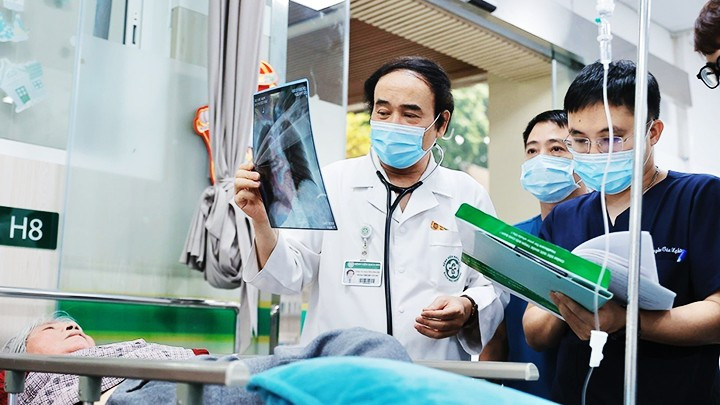 |
| The A9 Emergency Department at Bach Mai Hospital often handles severe cases. (Photo: VNA) |
Voices from practice
Bach Mai Hospital is the last line of treatment for serious cases. At the A9 Emergency Department, over 200 patients are admitted daily, most requiring intensive and life-saving interventions. Given the acute nature of their conditions, many are thrust into a desperate battle between life and death. A few days ago, N.T.L., a 35-year-old man from Ba Be District, Bac Kan Province, was transferred from a local hospital in critical condition. He was suffering from severe pneumonia complicated by septic shock and respiratory failure. Doctors immediately ordered blood purification and ECMO (extracorporeal membrane oxygenation) support. However, the patient and his wife, both freelance workers, had not purchased health insurance due to financial constraints. The cost of treatment—averaging around 10 million VND (approx. 400 USD) per day—left the family at a complete loss. “One session of blood purification costs 15 million VND, and ECMO setup is over 100 million VND. We just cannot afford it,” said his wife. “The doctors helped me file for financial assistance”.
For patients like N.T.L., without urgent financial support, hospital care is simply out of reach. At the A9 Emergency Department, many families echoed a common hope: that the government’s policy of free hospital fees be implemented soon to relieve the immense financial burden. “Some patients here have insurance, some do not, or still need to make co-payments,” said Nguyen Hong Van, a resident from Soc Son District, Hanoi. “But serious illness means costly medications and specialised procedures, so hospital fees remain very high. Nobody chooses to get sick. But when it happens, it can devastate a family. The State’s plan to eliminate hospital fees is a tremendous relief and a deeply compassionate move.”
At the Nuclear Medicine and Oncology Centre under Bach Mai Hospital, the hallway outside is already packed with patients awaiting consultation even early in the morning. Inside, hospital rooms are busy with patients receiving injections, drips, or undergoing specialised treatment. For many cancer patients, the disease is only discovered at a late stage, when treatment becomes not only more complicated but also significantly more costly. N.T.H., a woman from Nho Quan District, Ninh Binh Province, is currently caring for her husband, who is suffering from late-stage lung cancer that has metastasised to his liver and bones. “The immunotherapy drugs cost 70 million VND (approx. 2,800 USD) per month and are not covered by health insurance. On top of that, we must pay for tests, radiotherapy, chemotherapy, hospital beds, and nutritional support”, she said. “We had to sell our house in the countryside just to afford proper treatment. I have seen so many patients who, unable to afford care, asked to be discharged and went home… to suffer and die. With this new policy of free hospital care, I hope more cancer patients will have a real chance at surviving longer.”
Dr Pham Le Trung, a Meritorious Physician and Director of Sa Pa General Hospital (Lao Cai Province), hailed the policy as a “groundbreaking and compassionate move,” especially for people in remote mountainous areas and ethnic minorities. “This will greatly improve their quality of life”, he said. While residents of remote communes are still eligible for free health insurance provided by the government, some recent changes have caused concern. As certain areas are reclassified as having completed the ‘new rural development’ programme, they are no longer considered disadvantaged and thus lose eligibility for free insurance coverage—even though people’s living conditions remain difficult. “A basic hospital stay of 5–7 days already costs 2–3 million VND, while surgery can cost up to 10 million. That kind of money is nearly impossible for many families here”, Dr Trung explained. “In recent times, our hospital has had to waive fees for many patients who simply could not pay. Through our Social Work Department, we have received support in all forms, from used clothing to meals of instant noodles and porridge. But if a patient must be transferred to a higher-level hospital for serious treatment, the burden grows even heavier.”
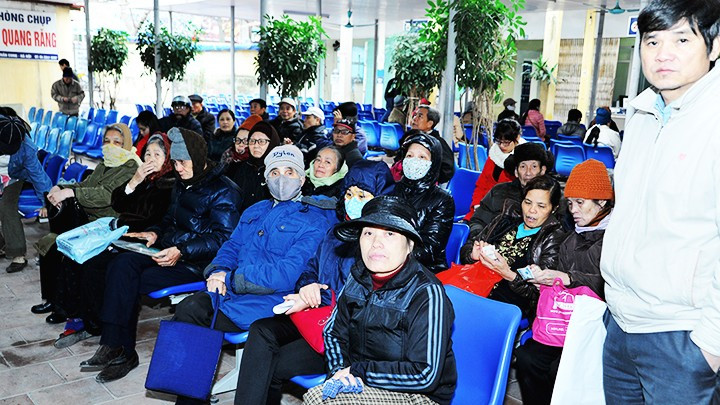 |
| Patients waiting for medical examination and treatment at E Hospital. (Photo: NAM HAI) |
Policy in the right direction
"Party General Secretary has mentioned the roadmap: from now until 2030, we will implement the policy of free hospital fees. In fact, we are already heading in the right direction, progressing toward universal health insurance (HI). HI is one of the main pillars of the social security system. Moving toward free healthcare, where every citizen has a health insurance card to access and benefit from medical services, demonstrates the Party and State’s concern for equitable healthcare for all", stated Nguyen Duc Hoa, Deputy General Director of Vietnam Social Security under the Ministry of Finance.
Currently, the scope of HI coverage, including medicines, medical supplies, and technical services, has been expanded to better meet patient needs. Many expensive medications, including targeted drugs for cancer treatment, have been added to the list of reimbursable items under HI. High-cost medical devices such as artificial hip joints and arterial stents have also been reimbursed, with billions of VND covered annually by the HI fund. Moreover, 100% of healthcare facilities nationwide now use citizens’ ID cards for HI services, significantly streamlining administrative procedures, improving service quality, and enhancing fund management to prevent abuse.
For the largest general hospital in the country like Bach Mai Hospital, plays a key role in Vietnam’s healthcare system. Associate Professor Dr Dao Xuan Co, Director of the hospital, believes that current policies are on the right track. “Moving toward free hospital fees means ensuring people’s health is managed from the earliest stages — during pregnancy, at the grassroots level — through annual checkups and digital health records. Serious conditions, once detected, will be treated free of charge at central hospitals”, he said.
Dr Co shared a recent experience when a Bach Mai medical team travelled to a mountainous border district in Nghe An Province to offer free checkups. “We originally planned to examine 500–600 poor and policy-beneficiary residents. But once news spread, thousands came from nearby villages. In just one session, we treated over 3,000 people.” From trips like this, he concluded that primary healthcare remains inadequate and weak. Basic conditions like hypertension or diabetes could be detected early at the community level. However, people are not receiving timely checkups, so many patients only seek help when their condition worsens, requiring costly treatment at higher-level hospitals.
“In the villages, people only go to the hospital as a last resort. At the local clinics, they may get medicine for free, but going to the district hospital means selling chickens. Going to the provincial hospital means selling pigs, and going to a central hospital may require selling their buffalo, even their fields and farmland. That’s how a family just lifted out of poverty can fall back into it due to medical costs,” shared a doctor from Chiem Hoa District, Tuyen Quang Province.
“That’s why the policy of free hospital fees is not about encouraging people to flood central hospitals, creating unnecessary overload. Rather, it is about continuing to invest in primary healthcare right at the grassroots. The whole country are currently reorganising administrative units, moving toward eliminating district-level governance. So how will district health centres and hospitals operate in a way that connects with grassroots and village-level healthcare? This is an opportunity for us to concentrate resources and reorganise the grassroots healthcare system so that it is close to the people, only then can the people truly receive proper care,” Dr Co proposed.
Statistics from the Social Work Department under Bach Mai Hospital show that between 2022 and 2024, the unit mobilised resources to support patients in accessing treatment. Accordingly, more than 18 billion VND was directly donated to disadvantaged patients, and over 17 billion VND was used to provide gifts and free meals for patients.
Towards universal health insurance, investment in grassroots healthcare
“The General Secretary’s direction of “running while getting in line,” in the context of moving toward free healthcare forces us to act now—rather than wait until everything is perfectly in place. By then, it might be too late,” Associate Professor, Dr Dao Xuan Co reflected. According to him, to realise free healthcare and provide comprehensive healthcare for all, the priority must be the investment in grassroots healthcare, focusing on early-stage and basic care. In addition, there must be a clear plan to develop a network of large, specialised medical institutions. Especially important is the training and quality improvement of human resources. Dr Co emphasised that now is the right time for the Government to rebuild the primary healthcare model to ensure it is strong enough and operates effectively.
At the local level, many provinces have opted to sign comprehensive medical cooperation agreements with top-tier hospitals like Bach Mai Hospital for training and technical transfer. For instance, in mountainous northern provinces such as Yen Bai, Lao Cai, Lai Chau, and Dien Bien, both basic and advanced medical techniques are now being implemented locally. These include cardiovascular and neuro-interventions, stroke treatment, critical care from basic to advanced levels, endoscopy, pediatrics, obstetrics, and respiratory care. Provinces have invested in medical equipment and human resources, sent their healthcare staff to Bach Mai Hospital to improve their knowledge and skills, while experts from Bach Mai travel to local hospitals to transfer techniques. ““For patients suffering from myocardial infarction or stroke, every minute counts. time is golden. If they have to be transferred all the way to Bach Mai Hospital, that ‘golden time’ is already lostsaid Associate Professor, Dr Dao Xuan Co with heartfelt concern. Therefore, if grassroots healthcare is properly invested in and local doctors are empowered, a healthier population contributes to local prosperity.
An effective grassroots system also helps ease the burden on central-level hospitals. Large and specialised medical centres like Bach Mai, Viet Duc, Cho Ray, and K Hospital can then focus on treating complex, rare, or highly specialised diseases. These hospitals will evolve into scientific research hubs, pioneering new methods in diagnostics and treatment, discovering new medications, and serving as centres for training both basic and advanced medical personnel. Notably, with strategic investment by the government in a select number of specialised hospitals, Vietnam aims to reduce outbound medical tourism. Retaining this vast resource, estimated to be worth billions of US dollars, could be reinvested into building robust healthcare infrastructure, equipment and facilities.
According to statistics from Vietnam Social Security (VSS), in 2024, 94.29% of the population had health insurance cards. The target for 2025 is for about 95% of the population to be covered by health insurance. Over 95.5 million people nationwide have health insurance cards, leaving only around 6 million in the "coverage gap". The VSS has signed contracts with both public and private healthcare facilities, accounting for about 13,000 healthcare units (including commune health stations), to ensure people have access to medical examination and treatment. In 2024, there were 183.6 million medical visits. The average cost per outpatient visit was 357,000 VND, and for inpatient treatment, it was 5.5 million VND per case.
Meanwhile, Deputy Director of Vietnam Social Security Nguyen Duc Hoa, achieving the goal of free hospital fees requires reliance on three main resources: the Health Insurance Fund, the state budget (both central and local levels), and mobilised social contributions. These three sources must be accompanied by strict management. “It is essential to practice thrift and avoid waste in using the health insurance fund, especially when it comes to prescribing medical services—overuse of diagnostic tests must be avoided”, said Hoa.
He proposed that implementing this goal requires a clear roadmap and action plan. Firstly, universal health insurance goal must be promoted, with an accelerated goal of 100% population coverage. Secondly, financial support will be increased for citizens, especially those in difficult circumstances and ethnic minorities. It is necessary to raise the subsidy level for purchasing health insurance cards, leaving only a small co-payment to be covered by individuals, to promote personal responsibility.
Thirdly, the Ministry of Health needs to issue a primary healthcare package. This is an essential service for providing healthcare to the population, as stipulated in the Law on Health Insurance, but it has yet to be introduced. Fourthly, there must be a complete, transparent, and publicly available set of standardised treatment guidelines.
Fifthly, a comprehensive review and planning of the healthcare system is needed, from infrastructure and medical equipment to human resources. The system should be reorganised appropriately so that people can access quality healthcare services right from the grassroots level (such as commune health stations). “The Prime Minister has instructed that, before October 2025, data connectivity between healthcare facilities must be promoted to reduce redundant testing for patients, as stated in Directive No. 07 dated April 14, 2023”, Hoa added.
Sixthly, the healthcare workforce must be professionally trained, have high quality, and be sufficient to meet the needs of healthcare facilities. If patients at the grassroots level receive high-quality treatment from well-qualified doctors, it will help reduce overload at higher-level hospitals. To improve the quality of medical professionals, there must be proper salary and compensation mechanisms for medical staff so they can focus on their expertise and improve the quality of healthcare services. In addition, healthcare services must be tightly and effectively managed, with a focus on thrift and minimising waste in medical examination and treatment.
“The policy of free hospital fees is deeply humane, but it must go hand in hand with improving the quality of medical services—it cannot be like charity work. To achieve this, the state budget must provide additional support to the Health Insurance Fund. In order to maintain the fund's balance, inspection and supervision must be emphasised. A strict and transparent mechanism for managing and allocating resources is necessary to prevent loss and abuse of services. It is also essential to establish a national health coding system and electronic medical records to ensure transparency in operations, in line with the Government’s Project 06”, Hoa proposed.
Assoc Prof Dr Nguyen Dac Vinh, Chairman of the National Assembly's Committee for Culture and Society, affirmed: “I firmly believe that under the leadership of General Secretary To Lam, with the determination of the entire political system and the broad support of the people, the goal of free hospital fees for all citizens is entirely feasible and will certainly be effectively implemented!”
